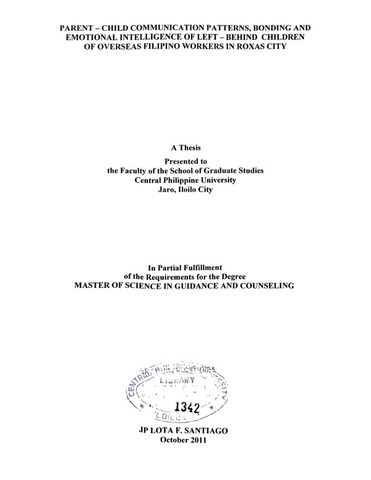Preference for alternative living arrangement for the elderly in urban China: Parents’ and children’s perspective

Page views
842Date
2012Author
Defense Panel Chair
Defense Panel Member
Share
Metadata
Show full item record
Abstract
The primary of objective of this study was to determine the parents’ and children’s preference for alternative living arrangement for the elderly in urban China. The study further aimed to determine the relationship between characteristics and attitudes of both the parents and children towards living arrangement, present living arrangement and their preference for alternative living arrangement for the elderly.
The respondents of the study consisted of 768 randomly selected people aged 20 years old and older coming from the four communities of the Haidian District in Beijing, China.
This study utilized the one-shot survey design. To gather the data needed, the researchers used two types of questionnaires: the personal information sheet and checklist questionnaire to answer the specific of objectives of the study. The data were coded, encoded and analyzed by computer using the software, Statistical Package for Social Sciences (SPSS).
The study hypothesized that the parents’ and the children’s preferences towards living arrangement for the elderly vary according to their personal characteristics such as age, sex, civil status, educational attainment, occupational status, monthly income, family size and place of origin.
It was hypothesized further that there was no significant relationship between their characteristics and attitudes towards living arrangement, present living arrangement and their preference for alternative living arrangement for the elderly.
Majority findings
Parents
1. Out of the total respondents, majority of the parents are married, college graduates, earned income of 10,001 RMB and above, and belonged to the age bracket of 40-49 years. Of this number, 50% are males and 50% are females and majority of them have only one child.
2. Majority of the parents are living together with their children, while others preferred to live alone. At present, none of them is living in the nursing home and community for the aged.
3. The parents had mostly agreed to the attitude about elderly living Arrangement.
4. No significant relationship exist between the parents’ personal characteristics when grouped according to age, sex, civil status, educational attainment, occupation, monthly income, family size and place of origin and their attitude towards living arrangement of elderly in terms of the attitudes listed, their present living arrangement and the parents’ preference for alternative living arrangement.
Children
1. Out of the total respondents, majority of the children are married, graduates of high school/technical secondary school, earned income of 10,001 RMB and above, and belonged to the age bracket of 30-39 years. Of this number, 50% are males and 50% are females and majority of them have only one child.
2. Majority of the children respondents are presently living “together with children”, while others are living alone. None of them is living in the nursing home and community for the aged.
3. The children respondents preferred for alternative living arrangement for they want to “live alone”. Other reasons of the children include: live together with children, live in community of the aged and other will stay in nursing home.
4. No significant relationship exist between the children’s personal characteristics when grouped according to age, sex, civil status, educational attainment, occupation, monthly income, family size and place of origin and their attitude towards living arrangement of elderly in terms of the attitudes listed, their present living arrangement and the children’s preference for alternative living arrangement.
Conclusions
1. Generally, majority of the parents and children are married, college and high school/technical secondary school graduates, earned income of 10,001 RMB and above, and belonged to the age bracket of 40-49 years and 30-39 years old. Of this number, 50 percent are males and 50 percent are females and majority of them have only one child.
2. It is concluded that majority of the parents and children are living together with their children while others preferred to live alone. At present, none of them is living in the nursing home and community for the aged. Thus, Chinese are family-orientation. The elderly like to live with their children. But children are very busy. They can not take care of their parents in the day. Children also want to see their parents every day. Almost Chinese parents reject to live in nursing home. The elderly should live with their children or they can often see their children.
3. However, it is also concluded that the parents and children respondents had mostly agreed to the attitude about elderly living arrangement, except for those who are earning an income of 6,000 RMB and below who have mostly disagreed to the attitude about elderly living arrangement.
4. Likewise, the parents and children respondents preferred for present living arrangement because they want to “live together with their children” and to “live alone”.
Description
Abstract only
Suggested Citation
Wuyi, Z. (2012). Preference for alternative living arrangement for the elderly in urban China: Parents’ and children’s perspective (Unpublished Doctoral dissertation). Central Philippine University, Jaro, Iloilo City.
Type
DissertationSubject(s)
Older people--Housing  ; Parent and adult child
; Parent and adult child  ; Families
; Families  ; Older people--Care
; Older people--Care  ; Old age homes
; Old age homes  ; Parents
; Parents  ; Older parents
; Older parents  ; Aging parents
; Aging parents  ; Adult children of aging parents
; Adult children of aging parents  ; Adult children
; Adult children  ; Aging parents--Family relationships
; Aging parents--Family relationships  ; Aging parents--Housing
; Aging parents--Housing  ; Older parents--Housing
; Older parents--Housing  ; China--Beijing--Haidian Qu
; China--Beijing--Haidian Qu 
Keywords
Department
School of Graduate StudiesDegree
Doctor of ManagementShelf Location
GSL Theses 658.0072 W969
Physical Description
xviii, 158 leaves
Collections
- Doctor of Management [20]
The following license files are associated with this item:
Except where otherwise noted, this item's license is described as Attribution-NonCommercial-NoDerivs 3.0 Philippines
Related items
Showing items related by title, author, creator and subject.
-
Factors associated with attitudes towards and coping strategies in the care of elderly parents among Central Philippine University personnel
Cadigal, Lena G. (2009)This study measured the attitudes and coping strategies of CPU personnel during summer 2008 with elderly parents and identified their demographic characteristics (sex, civil status, family income, and number of parents; ... -
Parent-child communication patterns, bonding and emotional intelligence of left-behind children of overseas Filipino workers in Roxas City
Santiago, JP Lota F. (2011)This study was conducted to determine the relationship between the parent - child communication patterns, bonding and emotional intelligence of the left-behind children of Overseas Filipino Workers (OFW) in Roxas City. ... -
A study of the relationship between parents' participation in pupil's learning activities to academic performance
Espolong, Ramie Soberano (1990)The study attempted to find out the relationship of parents' participation in pupils learning activities on academic performance; considering other characteristics of pupils such as their intelligence, household income, ...







